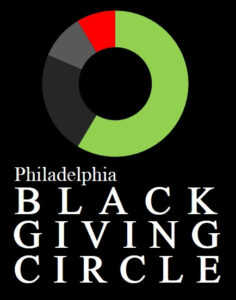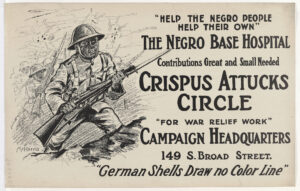August is Black Philanthropy Month commemorating the rich and enduring tradition of giving within Black communities that dates back to West African cultures long before colonial times. This legacy of generosity and support endured the harrowing journey of transatlantic human trafficking and became an essential means of survival during enslavement. Since then, Black philanthropy has been instrumental in liberating, uplifting, and supporting Black communities in America.
Philadelphia Black Philanthropy
Early Black philanthropists demonstrated remarkable resilience and entrepreneurial spirit by using their financial resources to fight slavery, fund education, and establish essential institutions. Philadelphia was foremost in developing leadership that became some of the first Black philanthropists in the nation. In 1787, Reverends Richard Allen and Absalom Jones founded Philadelphia’s Free African Society. It provided assistance to the sick, widowed, and orphans in Philadelphia’s Black community. The society was the first Black mutual aid society in Philadelphia and one of the first such organizations in the nation.
courtesy image, Reverends Richard Allen and Absolom Jones
Born in Pennsylvania around 1795, Stephen Smith bought his freedom by the time he was 21 and made his fortune in the lumber and real estate business in Pennsylvania. He was an abolitionist who funded the Freedmen’s Journal and the Emancipator newspapers. Smith hid runaways in trains used to transport coal and lumber on the railroad line he owned. He financially supported Philadelphia’s Institute for Colored Youth, the Home for Destitute Colored Children, and established the Home for Aged and Infirm Colored Persons which was renamed the Stephen Smith Home after his death in 1873.
Martin Delany, one the nation’s first Black nationalists and a dedicated abolitionist, was born in 1812 to an enslaved father and free mother in Virginia who fled to Pennsylvania. Delany helped found the Philanthropic Society of Pittsburg in 1834, which was a stop on the Underground Railroad. Along with the African Dorcas Society of New York and Philadelphia, the Philanthropic Society of Pittsburg established free schools for Black youth. Delany published the Mystery newspaper in Pittsburgh and helped Frederick Douglass publish and promote the North Star in New York.
Born free in Philadelphia, James Forten was a Revolutionary War hero. By 1830 he was a highly-successful entrepreneur and had amassed a fortune as a sailmaker. A member and supporter of several benevolent societies, he funded many abolitionist activities including supporting William Lloyd Garrison’s anti-slavery publication, The Liberator.
Colonel John McKee was a wealthy Black businessman and landowner in the 1800s. Born free to enslaved parents in Virginia, he fought in the Civil War as a lieutenant colonel of the 13th Regiment. After the war he moved to Pennsylvania where he bought and managed properties for newly-freed Africans to rent, eventually owning hundreds of acres of property across Pennsylvania, West Virginia, Delaware, Kentucky, New Jersey, and New York. Upon death, he left $2 million to Black philanthropic causes, including funds to build a church, rectory, and convent in his “McKee City,” as well as a school and orphanage in Philadelphia.
Henrietta S. Bowers Duterte was a prominent businesswoman and a philanthropist known for her charity fundraising. Born in 1817 into a well-established free Black family in Philadelphia, she was a member of the Underground Railroad who hid runaways in coffins or disguised them as part of funeral processions to ensure their safe passage. She used her business profits to support the Black community. Duterte raised money to pay the salary of the pastor of Allen Chapel. She also raised funds on behalf of Stephen Smith’s Philadelphia Home for Aged and Infirm Colored Persons and helped organize the 1866 Freedman’s Aid Society Fair to aid free Africans in Tennessee.
During World War I, Black people in Philadelphia organized the Crispus Attucks Circle for War Relief to raise funds for Mercy Hospital. Led by the well-known Archdeacon Henry L. Philips the organization raised funds for Mercy Hospital that was built to serve Black soldiers.
Lessons from Legacy
Today, this legacy of Black philanthropy continues to thrive with modern Black leaders following in the footsteps of their predecessors working to improve conditions for Black Philadelphians and their communities. Philadelphia Black Giving Circle’s mission is to cultivate charitable giving within the Black community, build capacity and financial sustainability of Black-led nonprofits, and address pressing needs facing the Black community in the Greater Philadelphia region.
Philadelphia Black Giving Circle’s mission is to cultivate charitable giving within the Black community, build capacity and financial sustainability of Black-led nonprofits, and address pressing needs facing the Black community in the Greater Philadelphia region.
The Medical Society of Eastern Pennsylvania, a professional organization of Black physicians, has a scholarship program that gives scholarships to Black medical students from each of the local medical schools who demonstrate leadership qualities and have contributed to projects that benefited the community.
100 Black Men Philadelphia provides funds for educational and other pursuits of the Black boys they mentor.
The Barristers’ Association of Philadelphia, Inc. provides dissemination of legal information of interest to the Philadelphia Black community. They also provide scholarships for Black law students.
The Beech Companies’ Alston-Beech Foundation provides grants to nonprofits that promote social welfare and combat community deterioration in North Central Philadelphia. The Beech Scholarship Fund provides annual scholarships to Black Philadelphia students attending, Lincoln University, Cheyney University, Temple University and Community College.
The Malcolm Jenkins Foundation is committed to supporting youth development initiatives and programs which emphasize education, character development, leadership, life skills, health and recreation for those in underserved communities.
Beyond established institutions, Black Philanthropy is a testament to the enduring spirit of giving within Black communities. Despite facing a wealth gap and societal challenges that puts them behind other racial groups, according to a report by the W.K. Kellogg Foundation, Black households give 25% more of their annual income than white households, and nearly two-thirds of Black households donate to organizations and causes, totaling $11 billion each year, underscoring the unwavering commitment of Black philanthropists.
The examples Black philanthropists have set throughout history remind us of the power of collective giving, community support, and resilience in the face of adversity. Black Philanthropy Month serves as a powerful reminder that philanthropy is more than just donating money; it’s about donating time, services and resources to empower and uplift communities. Black philanthropists have paved the way for positive change, and their legacy inspires us all to make meaningful contributions to the betterment of society.
By recognizing and celebrating Black Philanthropy Month, we honor these important traditions and encourage everyone to learn from them and partner with communities to make a positive impact. Will you?
-30-
Credit:Source link





